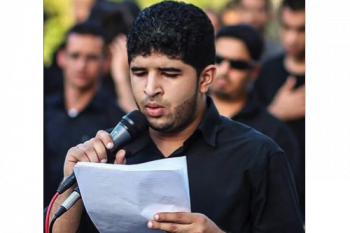AhlulBayt News Agency - Bahrain has suffered from a series of stinging attacks on the freedom of artistic expression in recent months.
The government often uses charges like “disrespecting the monarchy” to incriminate the citizens merely exercising their right to freedom of speech. The authorities’ most recent victim is poet Sayed Hasan Alawi. On the eve of his court hearing, Bahrain Center for Human Rights (BCHR) calls on the Government of Bahrain to release and drop all charges against him.
On 20 April 2016, Sayed Hasan Alawi, a 25 years old religious singer was incarcerated for reciting a poem. Sayed presented himself at Hamad Town roundabout 17 police station after he was summoned the previous day based on allegations that he insulted the king and the national flag. Sayed was interrogated in absence of a lawyer. The interrogation was related to a poem which Sayed had read out loud on 8 April during the funeral service of Ali Abdulghani, a teenager of 17 years old who was sentenced to five years imprisonment on charges for having participated in a demonstration. Ali was allegedly killed after succumbing to injuries sustained during his arrest by the Bahraini security forces.
During his arrest and interrogation, Sayed Hasan Alawi was intimidated and threatened with torture by the public prosecution. According to his family, he was verbally abused by the prosecutor and forced to sign a confession. Sayed is currently still in detention and awaiting his next court session due on 17 June.
After closely reviewing the poem for which Sayed Hasan Alawi is in jail, the BCHR found no direct reference to the king or other state symbol. BCHR believes that the accusation is based on a biased interpretation of the poem by the Bahraini authorities.
This is not the first case of reciting poems that have led to citizens being prosecuted. BCHR documented two prior cases of individuals who have been arrested in Bahrain for expressing their opinion peacefully and openly.
Ayat Al-Qurmezi, a 20 year old poet and student at the Faculty of Teachers in Bahrain, was arrested in 2011 and put on trial for openly reciting a poem that criticized government policy during gatherings at the capital’s Pearl Square. Ayat served two months of her one year sentence. During her incarceration, she was given no legal arguments and her lawyer was not authorized to speak. In addition, she was subjected to beatings, intimidation, harassment and even threats of rape and murder.
On 28 March, Ahmed Al-Ajami was arrested and interrogated in relation to a poem he recited during a solidarity event with imprisoned political leader Ebrahim Sharif. Even though Ahmed has been released, there is no information stating that no official charges will be pressed against him.
Article 19 (2) of the International Convention on Civil and Political Rights (ICCPR) contend that every individual has the right to freedom of expression; the right shall include freedom to seek, receive and impart information and idea of all kinds, regardless of the frontiers, either orally, in writing or in print, in the form of art, or through any other media of his choice. If arrested for exercising their freedom of speech, the right to a fair trial is obligatory. This right to a fair trial will include the presumption of innocence and the right to examine witnesses. According to the interpretation by the UN Human Rights Committee, all ICCPR provisions must be upheld throughout proceedings. This includes the absolute rights under article 7 not to be subjected to torture or to cruel, inhuman or degrading treatment or punishment, for any purpose.
The Bahrain Center for Human Rights calls on the Bahrain government to:
- Immediately and unconditionally release all political prisoners, arrested for merely exercising their right to freedom of speech and expression;
- Abide to international legislation upholding the right to freedom of expression without any restrictions or arbitrary legal procedures;
- End the politically-based retaliation against poets or singers and other artists, and allow them to freely exercise their rights to free speech and
- End the practice of imposing arbitrary restrictions on freedom of speech.
/129

